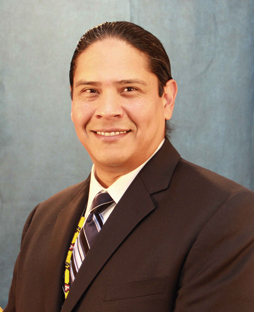
Chairman Jonodev Chaudhuri and Vice Chairwoman Kathryn Isom-Clause sat down with GGB Publisher Roger Gros in April at the Indian Gaming trade show in San Diego to discuss the transition between the Obama and Trump administrations and how the National Indian Gaming Commission has been staying the course.
This annual Tribal Government Gaming edition presents a chance to reflect on successes and challenges faced in the last year and stake out new opportunities for success in the coming year. Looking ahead, the National Indian Gaming Commission (NIGC) is well poised in 2017 to build upon past achievements and further advance its mission of serving Indian Country and the general public.
The reasons for the particularly strong posture of NIGC are manifold, but four key pillars come to mind:
1. the non-partisan nature of our statutory mission—one that is an outgrowth
of larger federal Indian policy principles of self-sufficiency and self-determination;
2. our strong relationships with our regulatory partners, chief among them tribal nations— the primary regulators of
Indian gaming;
3. consistency in our personnel from the top down; and,
4. the thoughtfully tailored priorities of the agency.
1. Our Mission
The Indian Gaming Regulatory Act was passed with bipartisan support in October 1988 and established the NIGC as the agency to provide federal regulatory oversight of the tribal gaming industry. The NIGC’s primary mission is to promote tribal economic development, self-sufficiency and strong tribal governments, maintain the integrity of the Indian gaming industry, and ensure that tribes are the primary beneficiaries of their gaming activities. To fulfill its mission, the NIGC works within the framework created by IGRA.
2. Our Partners
Although IGRA established the NIGC to serve as the federal regulator of tribal gaming, the act also reaffirmed the role of tribes themselves as the primary regulators of their gaming. The NIGC works with thousands of regulators across Indian Country to ensure not only the integrity of tribal gaming, but also that tribes are the beneficiaries of their gaming.
The Indian gaming industry has grown tremendously since its early days before the passage of IGRA. Much of that growth can be credited to the professional, strong and skilled tribal regulatory bodies that have developed with the industry. We recognize and rely on their expertise. I am thankful for the significant goodwill that exists between us.
3. Our People
As the NIGC was created from a statute that benefited from bipartisan support, it is no accident that we are a bipartisan agency, in which only two of the three commissioners may be from the same political party. Further, due to the unique structure of the commission, there is no turnover in its leadership when an administration changes.
The chairman, a Senate-confirmed appointee, and the commissioners are all appointed to serve three-year terms. Further, even when the commission itself changes, the NIGC staff remains. The NIGC’s organizational structure is composed of two main branches—the Office of General Counsel, which handles legal affairs; and the Office of the Chief of Staff, which manages day-to-day activities. The exemplary team within the NIGC continues to perform the critical day-to-day tasks necessary to support the sensible regulation of the industry.
4. Our Priorities
In addition to personnel, the agency’s priorities and initiatives, rooted in the mandates of IGRA, are well-equipped to help the agency continue to sensibly regulate by striking the important balance between robust safeguards and authorizing lawful entrepreneurial activity.
For example, the agency has recently made significant headway with a categorical exclusion for management contracts that do not include construction. Further, the agency is embarking on a robust consultation series to receive input from tribal leadership on numerous important topics, including Class III minimum internal controls draft guidance.
Recognizing the conflict between the industry’s need for updated standards and the limits of its authority, the NIGC drafted non-binding, voluntary guidance for which it is currently seeking feedback. We are also discussing the pending sunset provision that will require grandfathered Class II gaming systems to be tested to a larger array of standards than they must currently meet.
Finally, the agency’s day-to-day functions and administrative planning are governed by our tent pole initiatives:
1. Develop effective rural outreach to smaller gaming establishments in rural areas;
2. Stay ahead of the technology curve;
3. Support a strong workforce both within NIGC and among regulatory partners; and, 4. Protect against anything that
amounts to gamesmanship on the backs of tribes.
Examples of how these initiatives have helped inform agency actions include the creation of the Technology Division and its Information Technology Vulnerability Assessments, the possible creation of an eighth regional office in Rapid City, South Dakota, targeted compliance activity to address third-party threats, the creation of gamesmanship trainings, support of key personnel functions, and other efforts.
As the old truism goes, strong structures are built on strong foundations. Because of the sturdy nature of its mission, partners, people and priorities, the NIGC is confident about its continued ability to support the strong regulatory structure of Indian gaming. It is that strong structure that has led to sensible regulation that ensures the integrity of the industry while allowing the entrepreneurial spirit of tribes to flourish.
Without a doubt, our mission is ongoing, and does not allow us to stop innovating and developing with the industry, but we at the NIGC are solemnly committed to doing whatever we can to preserve the integrity of an industry that has been vital to the communities it touches. We look forward to another year of unbridled success with our partners.






